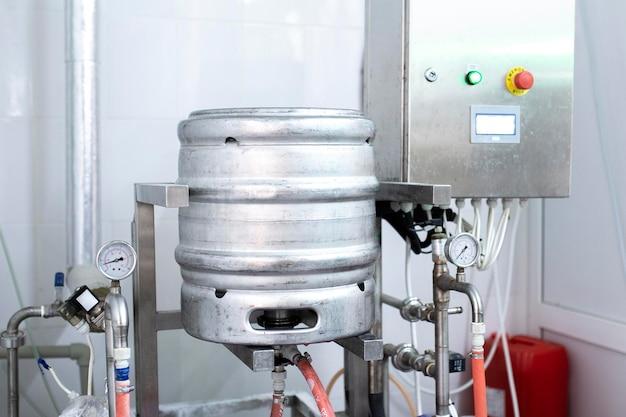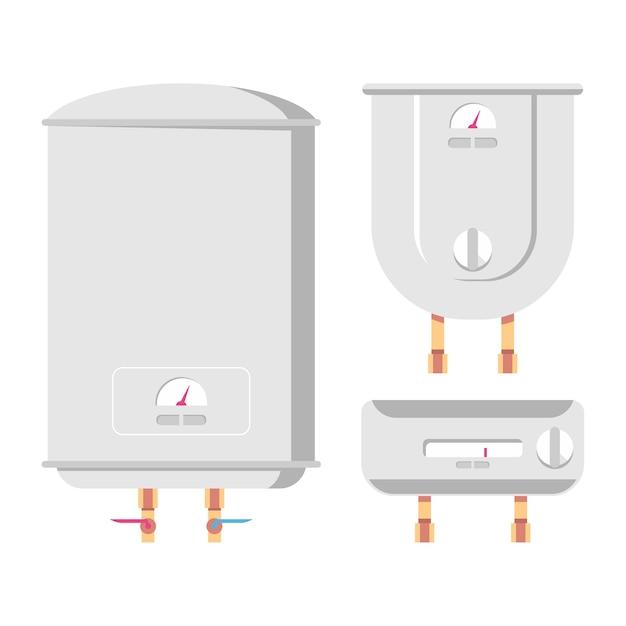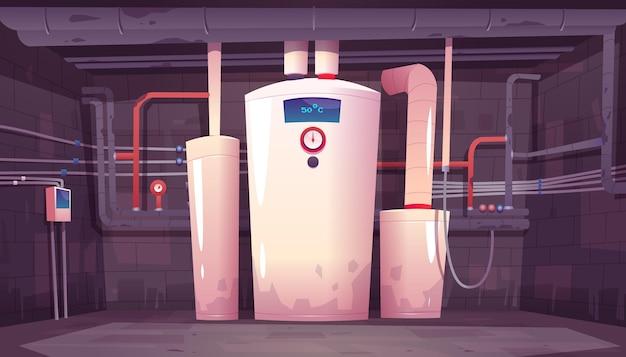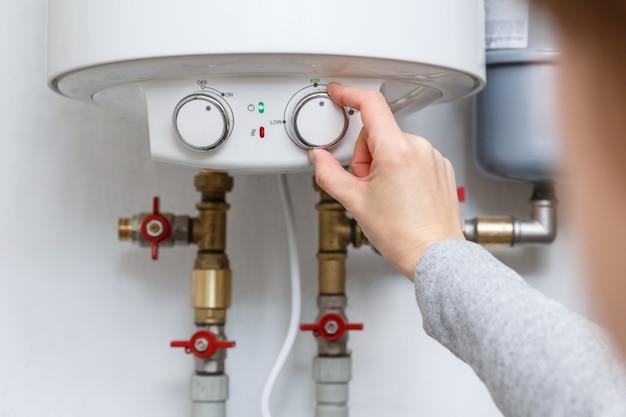In the quest for energy efficiency and endless hot water supply, tankless water heaters have gained immense popularity in recent years. These innovative appliances promise lower energy bills, a smaller ecological footprint, and continuous hot water on demand. However, as with any new technology, tankless water heaters come with their own set of trade-offs. One of the concerns raised by homeowners is the noise level emitted by these devices.
But just how loud are tankless water heaters? And why do some people compare their sounds to that of a jet engine? Let’s unravel the truth behind the humming and roaring symphony of these modern water heating units.
When you mention tankless water heaters, the first thing that often comes to mind is their energy-saving benefits. However, while these units excel in terms of efficiency, they can produce noticeable sounds during operation that may catch you off guard. So, if you’re contemplating installing a tankless water heater in your home, it’s essential to understand the potential noise issues you might encounter.
At times, you might hear an audible hum emanating from your tankless water heater. This humming sound is often created by the flow of water through the heating element. It is typically more pronounced when the unit is actively heating water. Although the sound level can vary depending on the specific model and installation, it is generally not a cause for concern and can be considered within reasonable limits.
On the other hand, a tankless water heater that roars like a jet engine might indicate a problem. If you find yourself constantly questioning the structural integrity of your home due to an overwhelmingly loud noise when your water heater is running, it could be a sign of an issue that requires professional attention.
So, just how loud is loud? Comparatively speaking, tankless water heaters tend to be quieter than their traditional tank-style counterparts. However, noise levels can still vary depending on factors such as the type of fuel used, installation quality, and the specific model of the water heater. In general, gas-powered tankless units tend to be quieter during operation than their electric counterparts.
In this blog post, we’ll delve deep into the reasons why tankless water heaters emit sounds, explore the causes behind the jet engine-like noise, and provide you with tips on how to reduce any excessive noise from your tankless water heater. So, let’s put on our detective hats and discover the truth behind the sounds that accompany these innovative appliances.
Stay tuned as we investigate the world of tankless water heaters, aiming to bring you answers to pressing questions such as, “Why is my tankless water heater so noisy? Are tankless water heaters louder than gas-powered units? And what is causing that peculiar humming sound when hot water is turned on?”
Without further ado, let’s embark on this sonic adventure, uncovering the mysteries behind these modern water heating marvels.
Are Tankless Water Heaters Loud
If you’re considering getting a tankless water heater for your home, you may have heard some concerns about noise levels. After all, who wants a loud contraption disrupting the peaceful atmosphere in their abode? In this section, we’ll debunk the myths, address the facts, and provide you with all the information you need to make an informed decision. So, let’s dive in and find out: are tankless water heaters really as loud as people say they are?
The Whispers of Quietness
Let’s start by dispelling the notion that tankless water heaters resemble a rock concert in your utility room. In reality, these modern marvels are designed with noise reduction in mind. While it’s true that some older models may have been notorious for their noise levels, manufacturers have since made significant improvements.
The Silent Symphony
Today’s tankless water heaters operate more quietly than ever before. Thanks to advanced technology and innovation, these devices produce minimal sound while going about their business of heating your water. In fact, you’ll probably find that the noise they emit is barely distinguishable from the background hum of your everyday household appliances.
The Decibel Demystified
To put things into perspective, let’s talk numbers. The noise level of an average tankless water heater can range from around 50 to 80 decibels. For reference, a normal conversation hovers around the 60-decibel mark, while a vacuum cleaner can reach up to 70 decibels. So, unless you plan on turning your utility room into a recording studio or hosting a dance party in there, the sound should be quite manageable.
Tackling the Troubles
If you’re still concerned about potential noise, fear not! There are steps you can take to further minimize the sound emitted by your tankless water heater. You can soundproof the area by insulating the walls or adding acoustic panels. Placing the unit on a vibration-absorbing mat can also help reduce any operational vibrations that may contribute to the noise.
Peaceful Waters Flow
In conclusion, tankless water heaters have come a long way in terms of noise reduction. While they may not achieve complete silence, the level of noise they produce is generally well within acceptable limits. So, feel free to embrace the convenience and efficiency of a tankless water heater without worrying about disturbing the peace in your home.
Tankless Water Heater Loud Humming
What Causes a Tankless Water Heater to Produce a Loud Humming Noise
If you’ve ever owned a tankless water heater, you may have experienced the annoyance of a loud humming noise. But what exactly causes this sound? Let’s dive into the possible reasons behind it.
Improper Installation
One common culprit for a tankless water heater humming sound is improper installation. If the unit isn’t installed correctly, it may vibrate against the wall or floor, causing the humming noise. Make sure to hire a professional plumber or technician to install your tankless water heater to avoid this issue.
Water Flow
Another factor that can contribute to the humming noise is water flow. If the water flow is too high or too low for the unit, it can create turbulence within the pipes, resulting in the humming sound. Adjusting the flow rate might be necessary to minimize the noise.
Scale Buildup
If you live in an area with hard water, scale buildup could be the reason behind the humming noise. Over time, minerals in the water can accumulate on the heating elements, causing them to vibrate and produce the humming sound. Regular maintenance, such as descaling the unit, can help prevent this issue.
Malfunctioning Components
Sometimes, the loud humming noise is an indication of a malfunctioning component. It could be a faulty fan, motor, or even a loose connection. If you suspect a problem with a specific part, it’s best to contact a professional technician who can diagnose and fix the issue for you.
How to Resolve the Humming Noise
Now that we know some of the possible causes of the loud humming noise in tankless water heaters, let’s explore how to resolve the issue.
Check Installation
If you suspect that improper installation is the root cause, visually inspect the unit to ensure it is securely mounted and not coming into contact with any surfaces. If you notice any issues, consult with a professional to reposition or secure the unit properly.
Adjust Water Flow
To optimize the water flow and reduce the humming noise, consider adjusting the flow rate. Most tankless water heaters have settings that allow you to control the flow. Experiment with different settings until you find the sweet spot that minimizes the noise.
Perform Regular Maintenance
To prevent scale buildup and potential humming noises, make sure to perform regular maintenance on your tankless water heater. This includes descaling the unit periodically and cleaning any filters or screens. Follow the manufacturer’s instructions for maintenance procedures and frequency.
Consult a Professional
If you’ve tried the above steps and the humming noise persists, it’s time to consult a professional. A qualified plumber or technician can accurately diagnose the issue and recommend appropriate repairs or replacements. Don’t hesitate to seek professional help to ensure the optimal functioning of your tankless water heater.
By understanding the potential causes and implementing the suggested solutions, you can enjoy the benefits of a tankless water heater without the annoyance of a loud humming noise. Remember, proper installation, water flow adjustment, regular maintenance, and professional assistance are key to a quiet and efficient tankless water heating experience.
How Loud Are Tankless Hot Water Heaters
If you’re considering upgrading to a tankless hot water heater, you may have concerns about the noise level. After all, no one wants to feel like they’re sharing their home with a jet engine. So, just how loud are tankless water heaters? Let’s take a closer look at the noise factor.
What to Expect in Terms of Noise
When it comes to tankless hot water heaters, noise levels can vary. However, you’ll be pleased to know that they generally operate at a quiet hum rather than a disruptive roar. Most modern tankless models are designed with noise reduction in mind, unlike their older, clunkier counterparts.
The Decibel Difference
To put things into perspective, let’s compare the noise level of a tankless water heater to some common everyday sounds. The average tankless unit operates at around 50 decibels, which is comparable to a low conversation or the hum of a refrigerator. So, unless you’re hosting a silent meditation retreat in your bathroom, you’re not likely to notice the noise.
How Location Can Affect Noise
Where you choose to install your tankless water heater can also have an impact on the noise level. Placing it in a well-insulated area or even a utility room (if possible) can help further dampen any sound. The key is to minimize exposure to living spaces, so you can bask in the warmth of endless hot water without any unnecessary disturbance.
Tips for Reducing Noise
If you’re still concerned about noise, there are a few simple steps you can take to minimize any disruption. One option is to install a soundproof enclosure around the unit, which can significantly reduce noise transmission. Additionally, regular maintenance and cleaning of your tankless hot water heater can ensure optimal performance and keep any operational sounds to a minimum.
In the grand scheme of noise pollution, tankless water heaters are like the quiet whisper in a library. They may emit a soft hum during operation, but nothing that will disturb your daily routines or leisurely bubble baths. So, rest assured, your tankless hot water heater won’t be partying louder than you are.
Why is my tankless water heater so noisy
One of the common concerns people have with tankless water heaters is the noise they can produce. If you’ve ever wondered why your tankless water heater seems to be making more noise than necessary, well, you’re not alone! Let’s take a look at some possible reasons why your tankless water heater is so noisy.
1. Combustion Noise
Tankless water heaters rely on combustion to heat the water. This combustion process can create some noise, especially when the heater is operating at full capacity. The sound may resemble a low rumbling or a continuous hum. The good news is that most tankless water heaters are designed with noise reduction features, so the sound should not be overly disruptive.
2. Buildup of Sediment
Over time, sediment and minerals can accumulate within the tankless water heater. This buildup can cause rattling or banging noises during operation. Regular maintenance, such as flushing out the system, can help prevent sediment buildup and minimize the noise. So, if your tankless water heater is starting to sound like a percussion instrument, it might be time for a little maintenance.
3. Water Flow Noise
When hot water starts flowing through the pipes, it can create a whooshing or whistling sound. This is more noticeable in tankless water heaters because they heat the water on demand, causing sudden changes in water flow. If the noise is bothering you, you can try adjusting the water pressure or installing noise-reducing devices, such as water hammer arrestors.
4. Venting Issues
Improper venting can also contribute to noise problems. If the venting system is not designed or installed correctly, it can cause air to rush through the pipes, resulting in whistling or hissing sounds. If you suspect venting issues, it’s best to consult a professional to ensure proper installation and avoid any potential safety hazards.
5. Expansion and Contraction
As the tankless water heater heats up and cools down, the metal components can expand and contract, causing creaking or popping noises. This is typically normal and harmless. However, if the noises are excessively loud or accompanied by other issues like water leaks, it’s best to have a technician inspect the unit to rule out any underlying problems.
In conclusion, while tankless water heaters can be noisier than traditional water heaters, the noise is usually not a cause for concern. However, if the noise becomes overly disruptive or is accompanied by other issues, it’s always a good idea to have a professional check it out. Remember, a little noise may be a small price to pay for the energy-efficient, endless hot water that tankless water heaters provide!
Are Tankless Water Heaters Louder Than Gas
When it comes to choosing a water heater for your home, noise is definitely a factor to consider. After all, nobody wants to be stuck with a noisy contraption disrupting their peace and quiet. In this section, we’ll dive into the comparison between tankless water heaters and gas water heaters in terms of noise levels.
Tankless Water Heaters: The Quiet Revolution
Tankless water heaters have gained popularity in recent years for their energy efficiency and space-saving design. But are they noisy? Not at all! In fact, tankless water heaters are often praised for their whisper-quiet operation. Unlike traditional gas water heaters, which rely on a constantly burning pilot light and noisy storage tanks, tankless models heat water on demand, eliminating the need for continuous heating and storage. This means no rumbling or hissing noises to disturb your tranquility!
Gas Water Heaters: A Symphony of Sound
On the other hand, gas water heaters can be quite the noisy bunch. From the constant hum of the pilot light to the occasional rumbling and clanging from the storage tank, these traditional water heaters can create quite a symphony of sound. If you crave a peaceful home environment, a gas water heater may not be the best choice for you. However, it’s worth noting that advancements in technology have led to quieter gas water heater models compared to their older counterparts.
Factors Influencing Noise Levels
While tankless water heaters generally win the battle of silence, there are a few factors to consider that could affect the noise levels of both tankless and gas models. The size of the water heater, its location, and the quality of installation can all play a role in the overall noise produced. Additionally, regular maintenance and flushing of the water heater can ensure optimal performance and keep noise levels to a minimum.
Final Verdict: Tankless is the Quietest Bet
In conclusion, if peace and quiet is a top priority for you, a tankless water heater is the clear winner when it comes to noise levels. With their efficient and silent operation, they offer a more enjoyable and serene living environment. However, with advancements in technology, gas water heaters have become quieter compared to their older counterparts. So, if you already have a gas water heater and don’t mind a bit of background noise, you don’t necessarily need to rush for a replacement. But if you’re in the market for a new water heater and value tranquility, the whisper-quiet operation of a tankless water heater is sure to make a splash in your home!
Tankless Water Heater Sounds Like a Jet Engine
Understanding the Noise Levels of Tankless Water Heaters
Tankless water heaters have gained popularity for their energy efficiency and space-saving designs. However, one concern that hovers in the minds of potential buyers is the noise level of these appliances. Some worry that the noise might be unbearable, comparing it to the roar of a jet engine. Let’s dive into the facts and fiction surrounding this common misconception.
Debunking the Jet Engine Myth
Contrary to popular belief, tankless water heaters do not sound like jet engines ready for takeoff. While it’s true that these units produce some noise during operation, it is far from the deafening roar one associates with a jet engine. In fact, the noise levels are comparable to a gentle hum or a soft whirring sound.
Identifying the Factors of Noise
Several factors contribute to the noise level of a tankless water heater. First and foremost, the brand and model play a significant role. Higher-end models are specifically designed to reduce noise levels, often incorporating insulation and sound dampening technologies. On the other hand, cheaper models may produce louder noises due to their less advanced construction.
Isolating the Sources of Sound
To understand the noise produced by tankless water heaters, it’s essential to identify the sources. One source of sound is the burner, which creates a combustion noise similar to a gas stove. The sound of water moving through the pipes can also be heard, especially if the pipes are poorly insulated or if water flow is high. Lastly, the fan, which helps in venting fumes, can contribute to the overall noise of the unit, but its operation is far from resembling a jet engine.
Strategies for Noise Reduction
If you find the noise level of your tankless water heater bothersome, there are a few measures you can take to reduce it further. Insulating the pipes can help minimize the sound of water flowing, while adding insulation around the unit itself can reduce the overall noise level. Additionally, positioning the water heater away from living spaces or bedrooms can help mitigate any sound disturbances.
While it’s true that tankless water heaters produce some noise during operation, it’s far from resembling a jet engine. The noise level is typically on par with a gentle hum or soft whirring sound, rather than a deafening roar. By understanding the factors that contribute to noise and implementing simple strategies for noise reduction, you can enjoy the benefits of a tankless water heater without any unfounded fears of living next to an airport runway.
Water Heater Makes Noise When Hot Water is Turned On
Introduction
One of the common concerns homeowners have when installing a tankless water heater is the noise it might make. No one wants a water heater that sounds like a jet engine taking off every time they turn on the hot water tap. In this article, we’ll explore the question, “Are tankless water heaters loud?” and specifically address the issue of why a water heater may make noise when hot water is turned on.
Why Does It Make Noise
-
Water Flowing: When you turn on the hot water tap, the tankless water heater immediately starts heating the water flow. As a result, you may hear the sound of water rushing through the pipes, which can be more noticeable in tankless models compared to traditional storage tank water heaters.
-
Burner Ignition: Tankless water heaters often use a gas burner to heat the water quickly. The sound of the burner igniting can sometimes be mistaken for a loud noise. Rest assured, it’s just the sound of the system doing its job efficiently.
Is the Noise Normal
-
Yes, it’s normal: While it’s true that tankless water heaters can be noisier than traditional models, the noise they produce is typically within a normal range. Don’t worry; you won’t need earplugs every time you take a shower!
-
Different noise levels: The level of noise can vary depending on various factors like the brand and model of the water heater, the size of the unit, the quality of installation, and the type of fuel used. Electric tankless water heaters tend to be quieter than gas-powered ones.
Addressing the Noise Issue
-
Proper insulation: Ensuring that your tankless water heater is properly insulated can help reduce noise levels. Adding insulation around the pipes and the unit itself can go a long way in reducing sound transmission.
-
Maintenance matters: Regular maintenance is crucial to keep your water heater functioning optimally and to address any noisy components. Clean the burner, check for any loose parts, and schedule professional maintenance as needed to keep things running smoothly.
So, if you’re worried about that loud noise when turning on the hot water, know that it’s normal for tankless water heaters to make some noise. However, with proper insulation and regular maintenance, you can minimize the noise and continue enjoying the benefits of endless hot water without disturbance. Just remember, a little noise is a small tradeoff for the efficiency and comfort that a tankless water heater provides.



